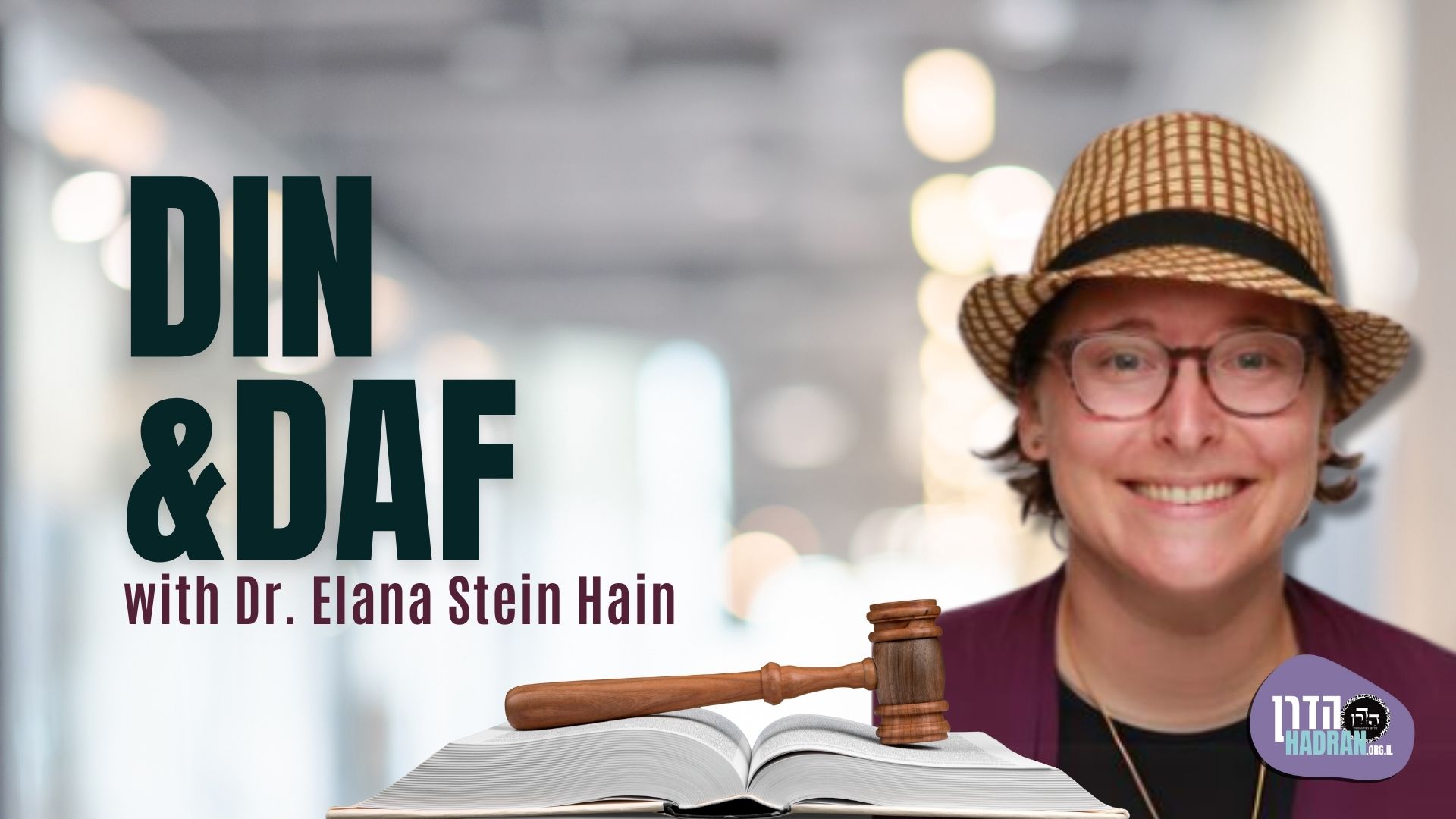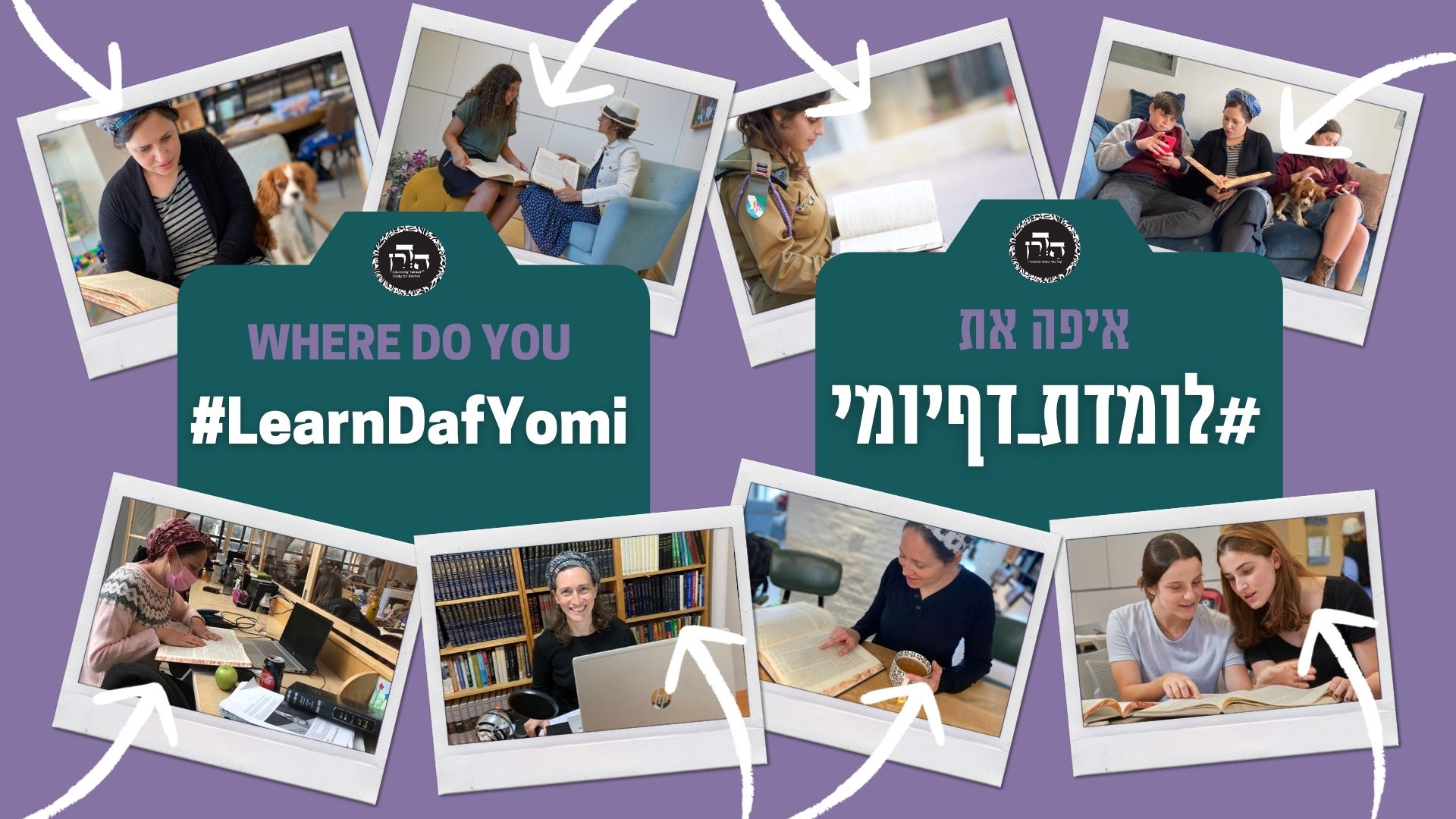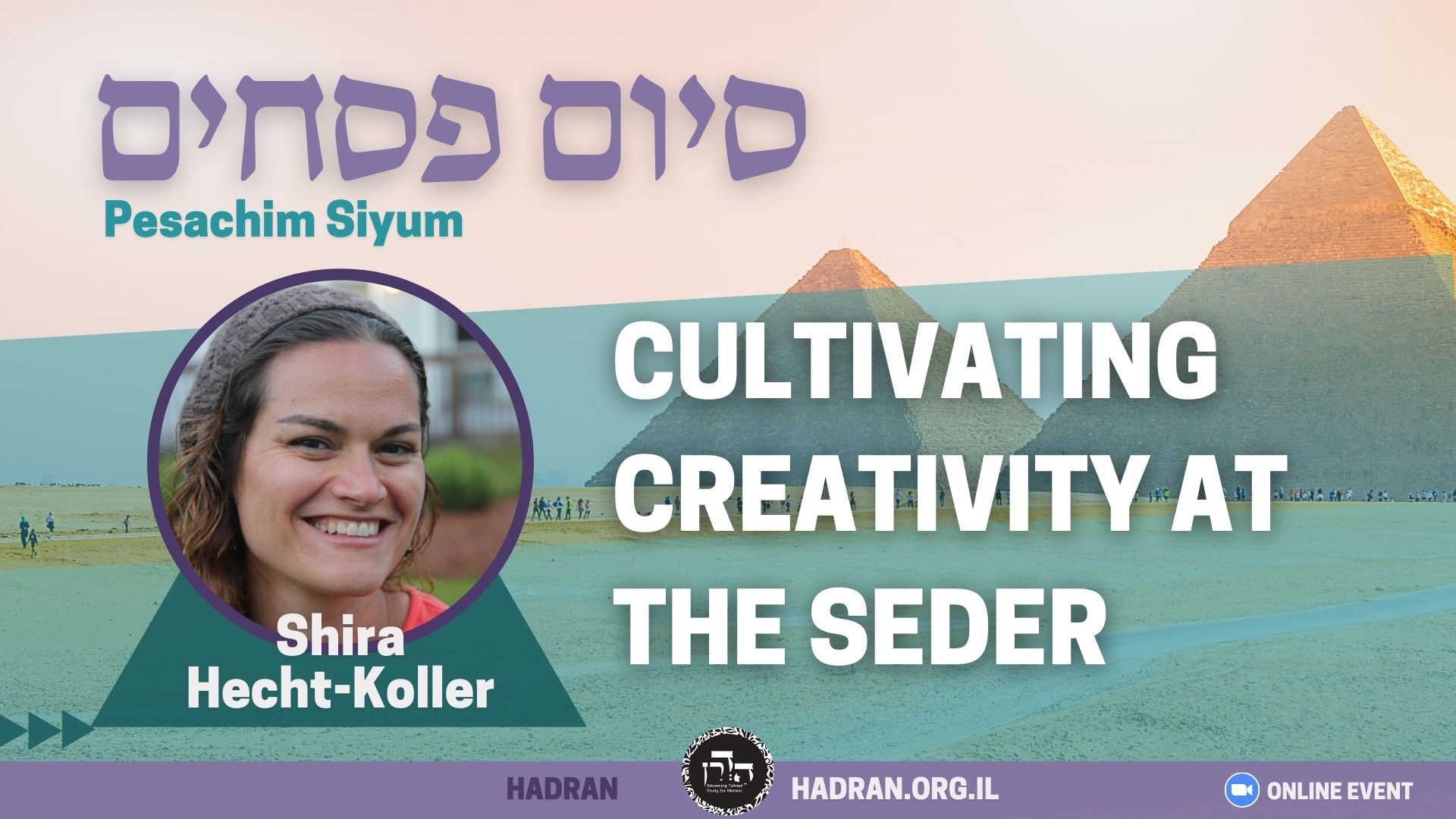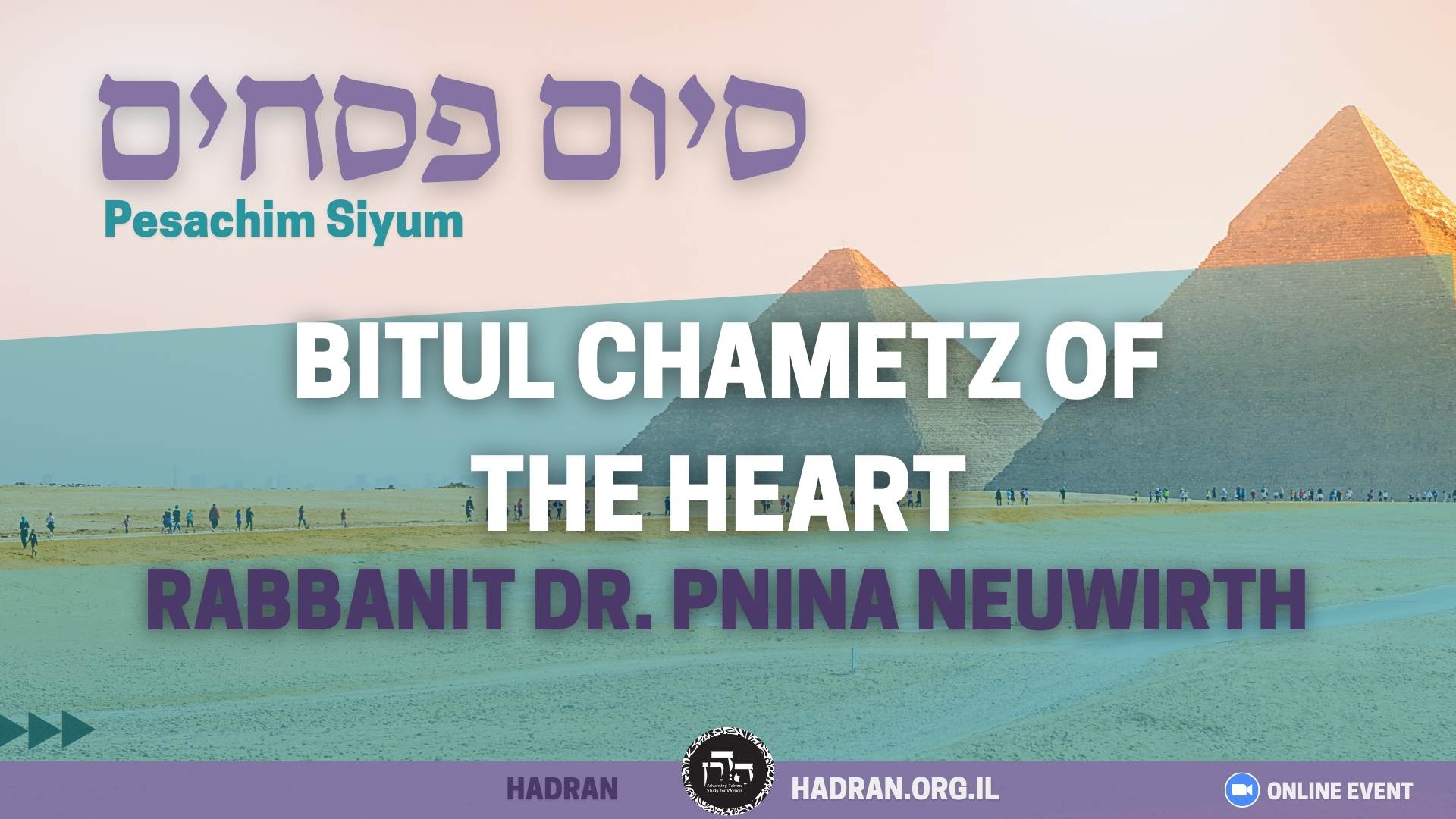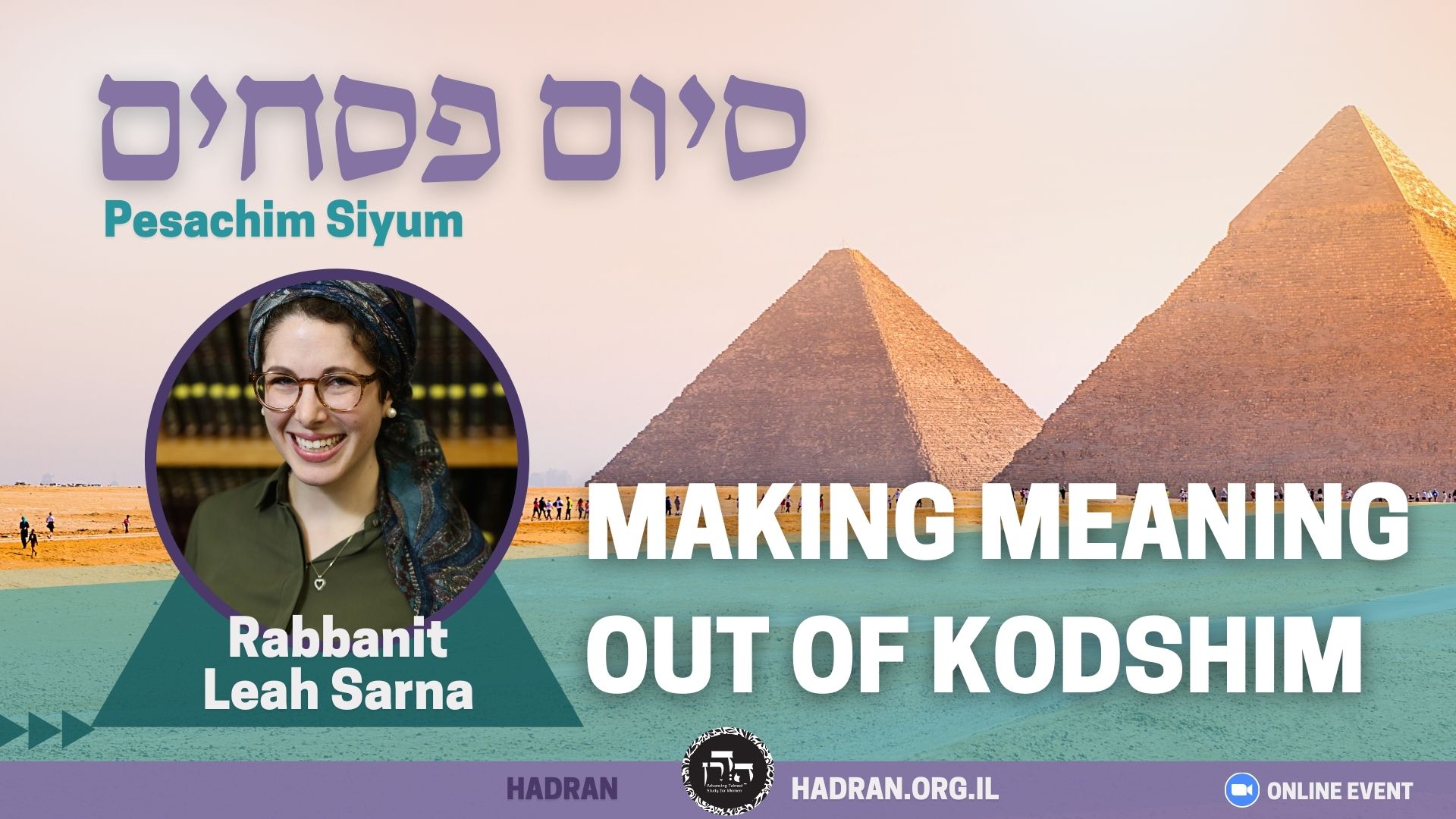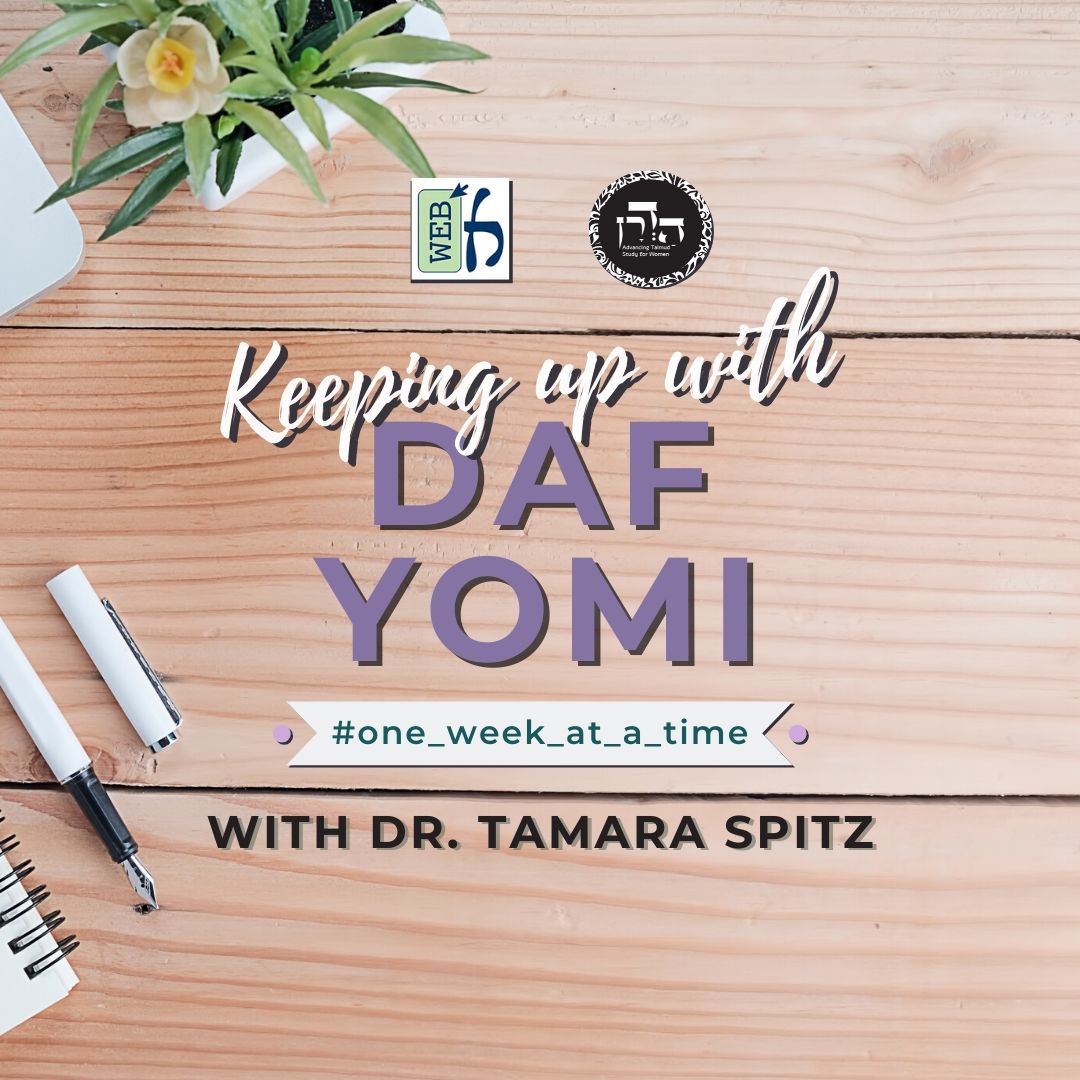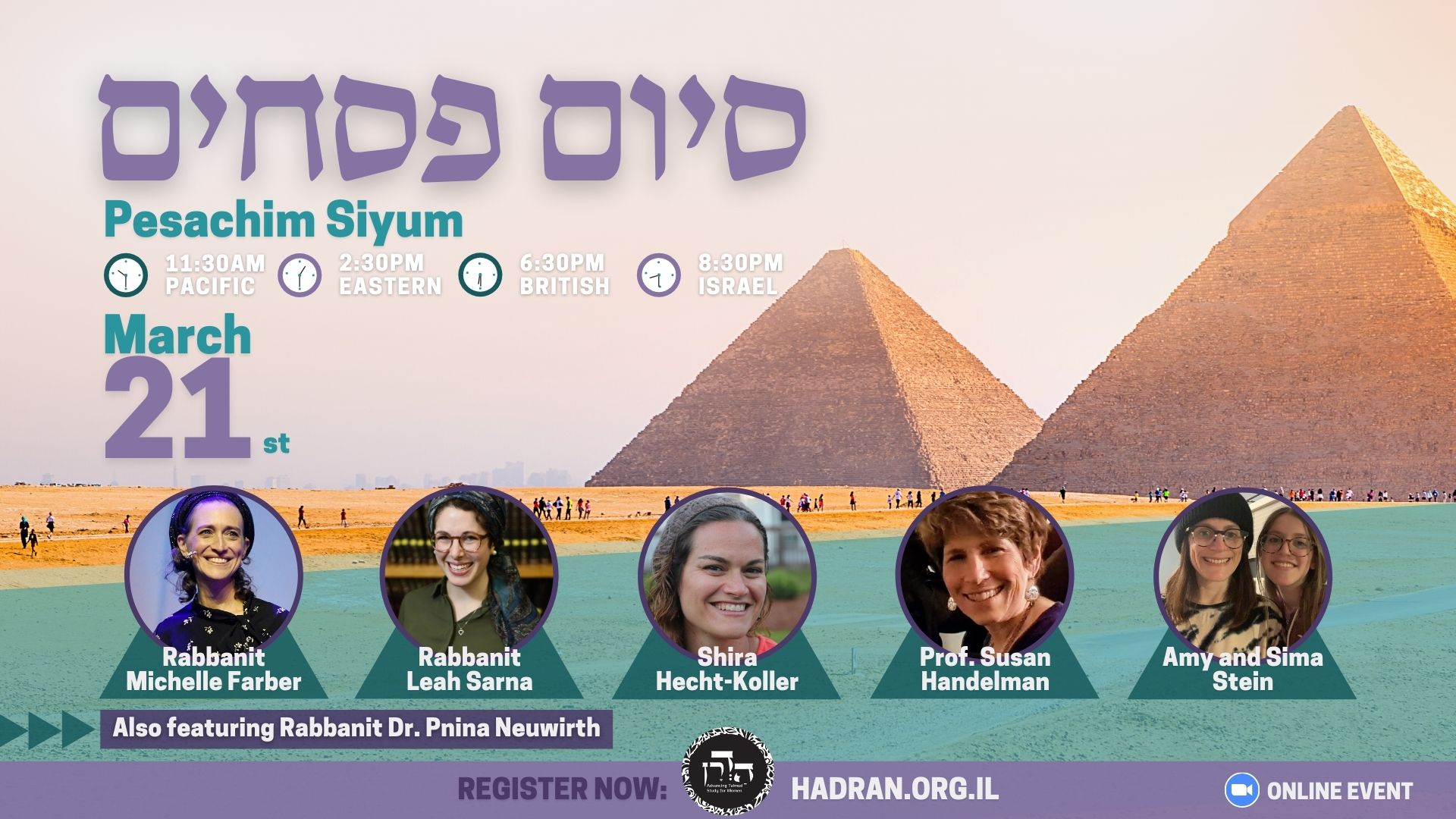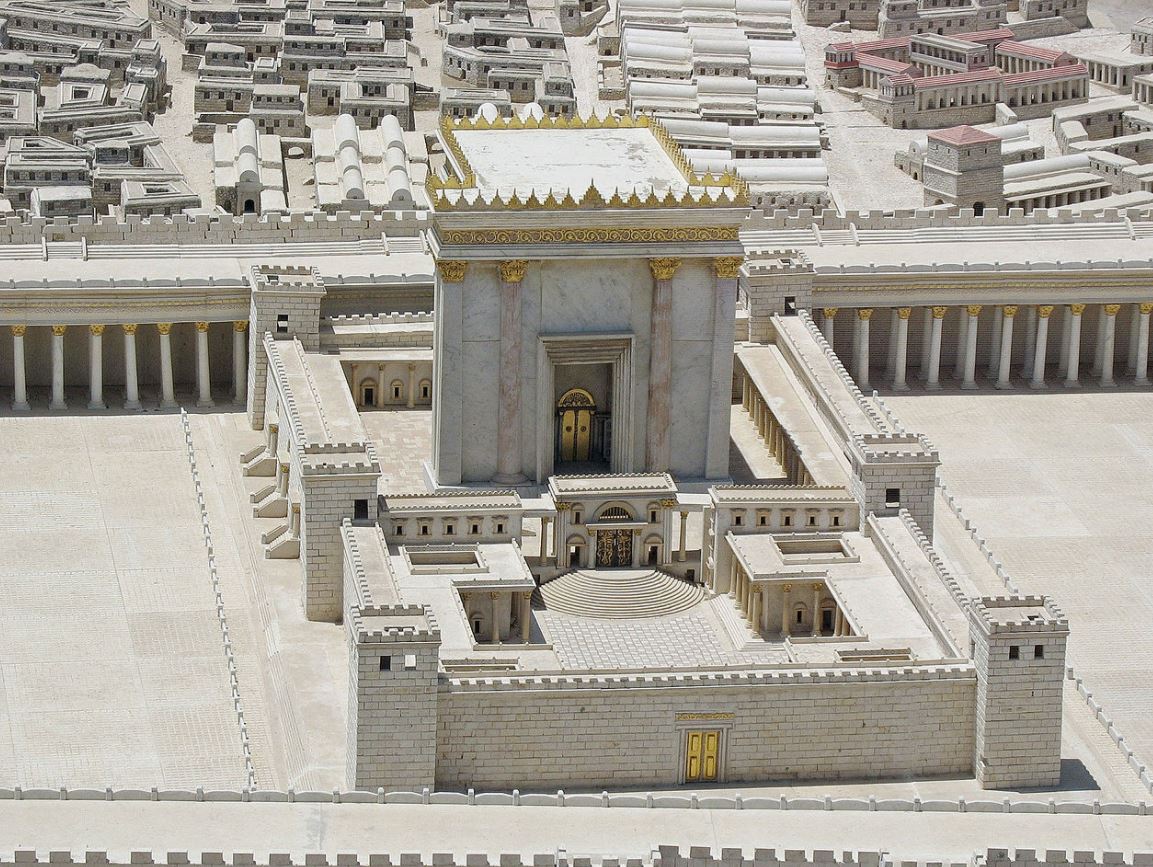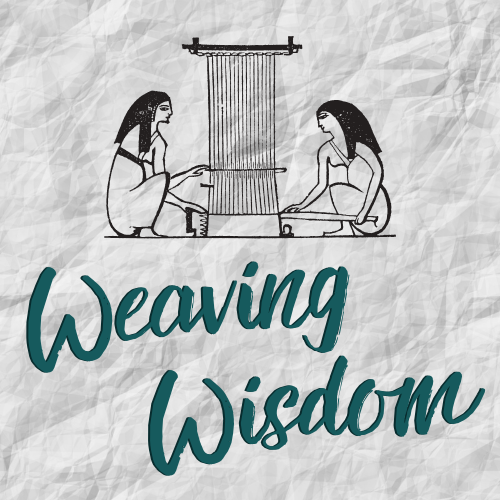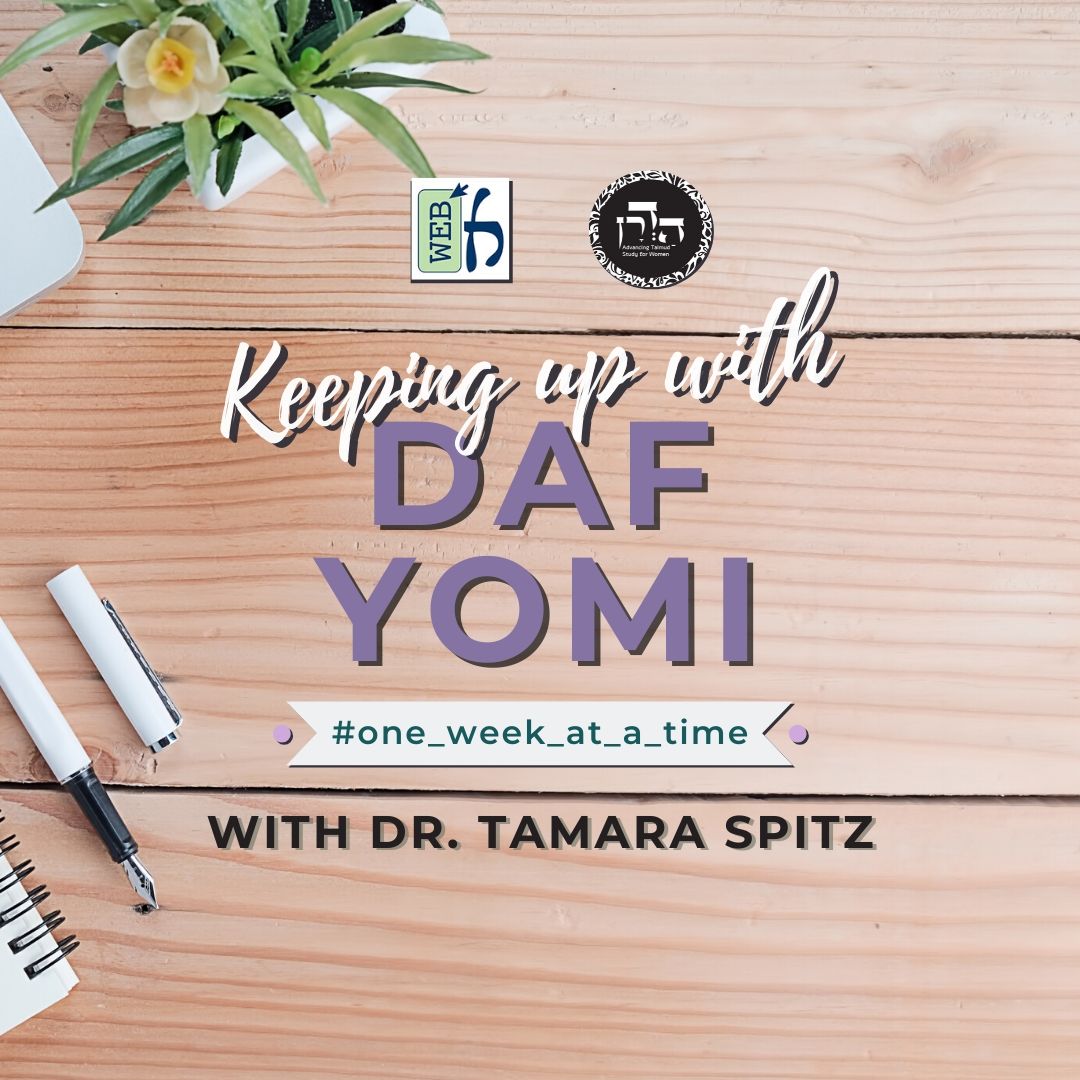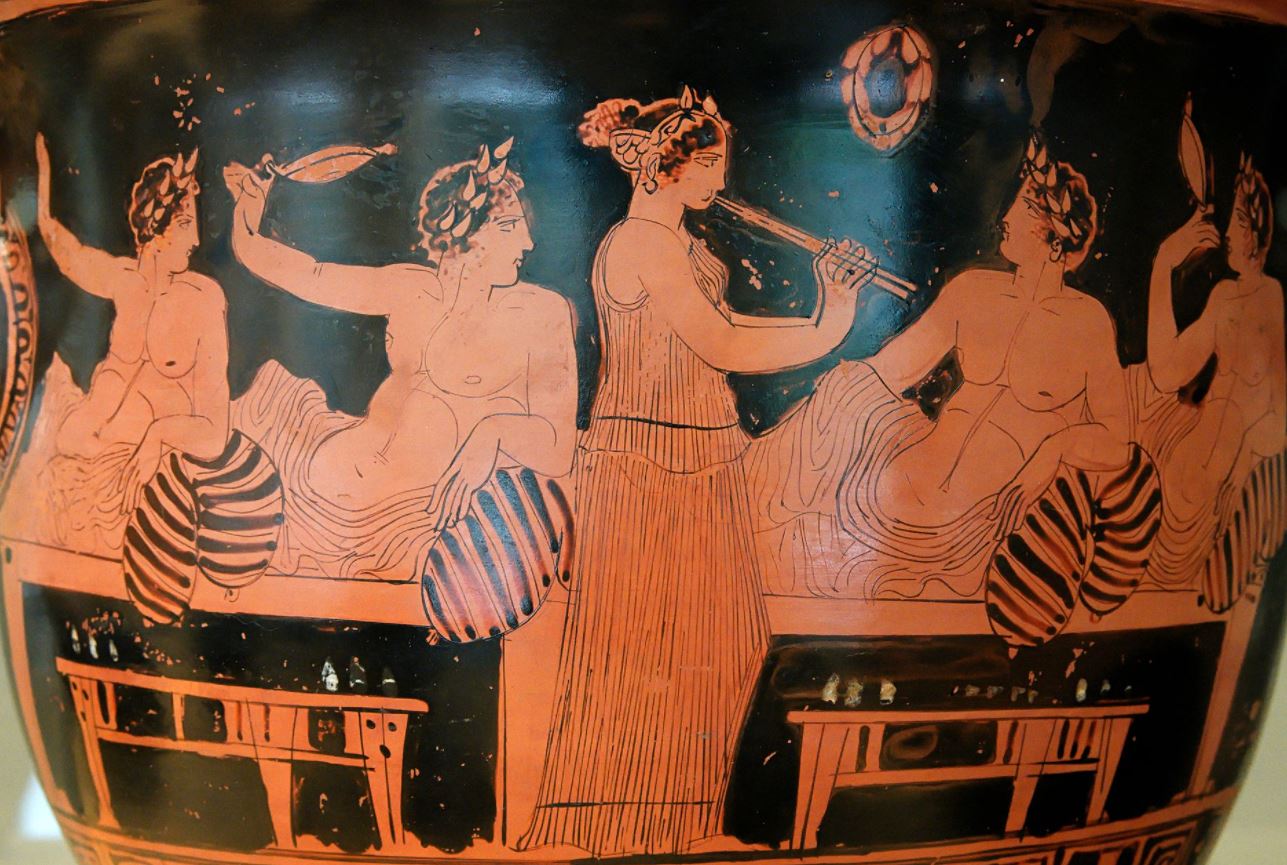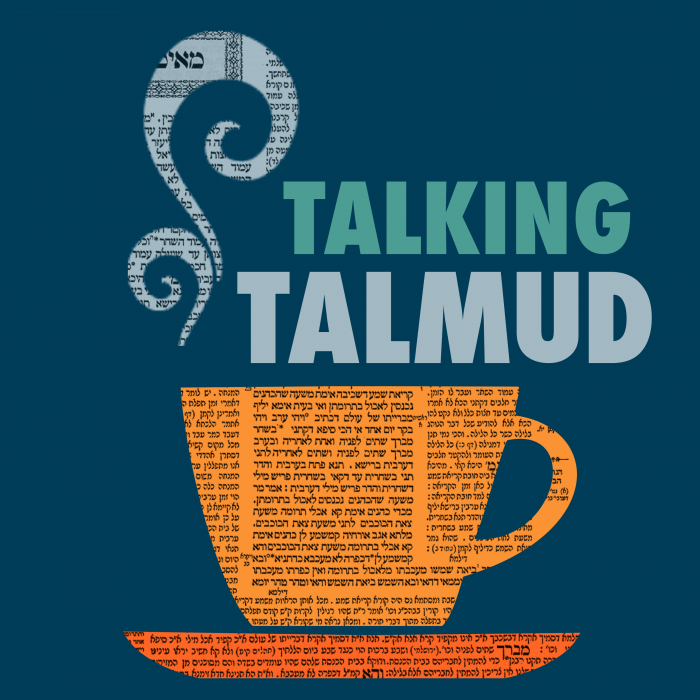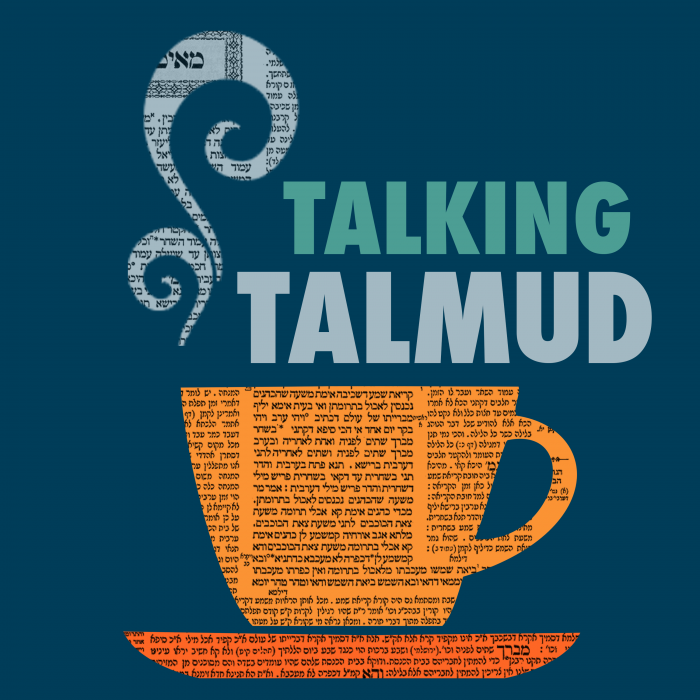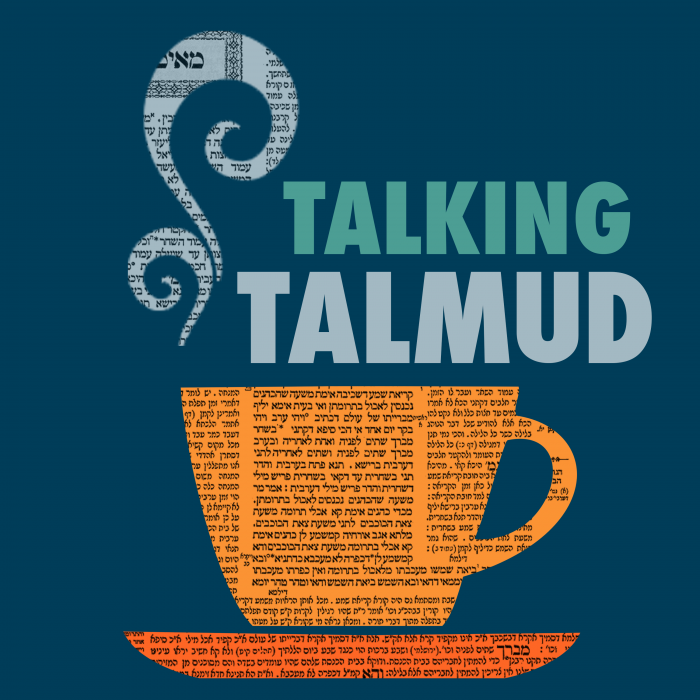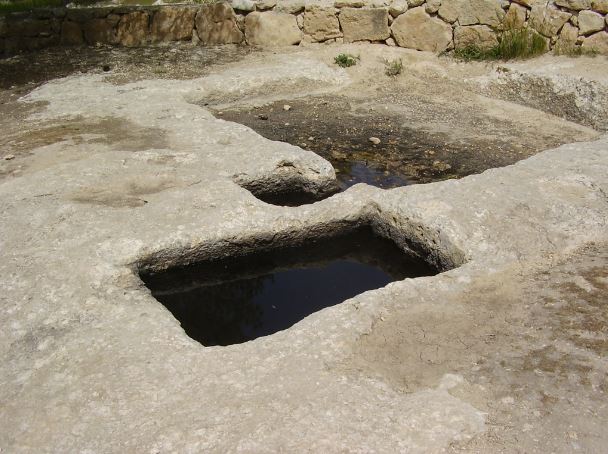Pesachim 118
מַאי ״בִּרְכַּת הַשִּׁיר״? רַב יְהוּדָה אָמַר: ״יְהַלְלוּךָ ה׳ אֱלֹהֵינוּ״. וְרַבִּי יוֹחָנָן אָמַר: ״נִשְׁמַת כָּל חַי״. תָּנוּ רַבָּנַן: רְבִיעִי גּוֹמֵר עָלָיו אֶת הַהַלֵּל, וְאוֹמֵר הַלֵּל הַגָּדוֹל, דִּבְרֵי רַבִּי טַרְפוֹן. וְיֵשׁ אוֹמְרִים: ״ה׳ רוֹעִי לֹא אֶחְסָר״.
The Gemara asks: What is the blessing of the song mentioned in the mishna? Rav Yehuda said: It is the blessing that begins with: They shall praise You, Lord, our God. And Rabbi Yoḥanan said that one also recites: The breath of all living, a prayer that follows the verses of praise [pesukei dezimra]. The Sages taught in a baraita: With regard to the fourth cup, one completes hallel over it and recites the great hallel; this is the statement of Rabbi Tarfon. And some say that one recites: “The Lord is my shepherd, I shall not want” (Psalms 23:1), in appreciation of the food he ate at the meal.
מֵהֵיכָן הַלֵּל הַגָּדוֹל? רַבִּי יְהוּדָה אוֹמֵר: מֵ״הוֹדוּ״ עַד ״נַהֲרוֹת בָּבֶל״. וְרַבִּי יוֹחָנָן אוֹמֵר: מִ״שִּׁיר הַמַּעֲלוֹת״ עַד ״נַהֲרוֹת בָּבֶל״. רַב אַחָא בַּר יַעֲקֹב אָמַר: מִ״כִּי יַעֲקֹב בָּחַר לוֹ יָהּ״ עַד ״נַהֲרוֹת בָּבֶל״.
The Gemara asks: From where does the great hallel begin and where does it end? Rabbi Yehuda says: From “Give thanks” (Psalms 136:1) until “The rivers of Babylon” (Psalms 137:1). And Rabbi Yoḥanan says: From “A song of ascents” (Psalms 134:1) until “The rivers of Babylon.” Rav Aḥa bar Ya’akov said: From “For the Lord has chosen Jacob for Himself” (Psalms 135:4) until “The rivers of Babylon.”
וְלָמָּה נִקְרָא שְׁמוֹ הַלֵּל הַגָּדוֹל? אָמַר רַבִּי יוֹחָנָן: מִפְּנֵי שֶׁהַקָּדוֹשׁ בָּרוּךְ הוּא יוֹשֵׁב בְּרוּמוֹ שֶׁל עוֹלָם וּמְחַלֵּק מְזוֹנוֹת לְכׇל בְּרִיָּה.
The Gemara asks: And why is this section called the great hallel? Rabbi Yoḥanan said: Because this passage states that the Holy One, Blessed be He, sits in the heights of the universe and dispenses food to every creature. The whole world praises God for His kindness through the great hallel, which includes the verse: “Who gives food to all flesh” (Psalms 136:25).
אָמַר רַבִּי יְהוֹשֻׁעַ בֶּן לֵוִי: הָנֵי עֶשְׂרִים וְשִׁשָּׁה ״הוֹדוּ״, כְּנֶגֶד מִי — כְּנֶגֶד עֶשְׂרִים וְשִׁשָּׁה דּוֹרוֹת שֶׁבָּרָא הַקָּדוֹשׁ בָּרוּךְ הוּא בְּעוֹלָמוֹ וְלֹא נָתַן לָהֶם תּוֹרָה, וְזָן אוֹתָם בְּחַסְדּוֹ.
Rabbi Yehoshua ben Levi said: These twenty-six mentions of the word hodu, give praise, in this hallel (Psalms 136), to what do they correspond? He explains: They correspond to the twenty-six generations that the Holy One, Blessed be He, created in His world, and to whom He did not give the Torah. There were ten generations from Adam to Noah, another ten from Noah to Abraham, and six generations from Abraham to Moses and the revelation at Sinai, i.e., Isaac, Jacob, Levi, Kehat, Amram, and Moses. And why did these generations survive, despite the fact that they did not learn Torah or perform mitzvot? They survived only because God sustained them through His mercy, even though they were undeserving.
אָמַר רַב חִסְדָּא: מַאי דִּכְתִיב ״הוֹדוּ לַה׳ כִּי טוֹב״? הוֹדוּ לַה׳ שֶׁגּוֹבֶה חוֹבָתוֹ שֶׁל אָדָם בְּטוֹבָתוֹ: עָשִׁיר בְּשׁוֹרוֹ, וְאֶת עָנִי בְּשֵׂיוֹ, יָתוֹם בְּבֵיצָתוֹ, אַלְמָנָה בְּתַרְנְגוֹלְתָּהּ.
Rav Ḥisda said: What is the meaning of that which is written: “Give thanks to the Lord for He is good” (Psalms 136:1)? It means give thanks to the Lord who exacts one’s debt, the punishment for a person’s sins and wickedness, in accordance with the goodness of each individual. God punishes each person based on his means. He punishes a wealthy person by taking his ox, and He punishes a poor person by means of his sheep. He punishes the orphan by taking away his egg, and He punishes the widow by means of her chicken. God punishes each person based on his ability to endure deprivation, and He does not punish people with more than they can handle.
אָמַר רַבִּי יוֹחָנָן: קָשִׁין מְזוֹנוֹתָיו שֶׁל אָדָם כִּפְלַיִים כַּיּוֹלֵדָה, דְּאִילּוּ בְּיוֹלֵדָה כְּתִיב: ״בְּעֶצֶב״, וּבִמְזוֹנוֹת כְּתִיב ״בְּעִצָּבוֹן״.
With regard to the praise due to God for sustaining the world, the Gemara cites a statement that Rabbi Yoḥanan said: The task of providing a person’s food is twice as difficult as the suffering endured by a woman in childbirth. While, with regard to a woman in childbirth, it is written: “In pain [be’etzev] you shall bring forth children” (Genesis 3:16), with regard to food, it is written: “In toil [be’itzavon] you shall eat of it, all the days of your life” (Genesis 3:17). Itzavon is a superlative form of etzev, which indicates that it is more difficult to support oneself than to give birth.
וְאָמַר רַבִּי יוֹחָנָן: קָשִׁין מְזוֹנוֹתָיו שֶׁל אָדָם יוֹתֵר מִן הַגְּאוּלָּה, דְּאִילּוּ בִּגְאוּלָּה כְּתִיב: ״הַמַּלְאָךְ הַגּוֹאֵל אוֹתִי מִכׇּל רָע״, מַלְאָךְ בְּעָלְמָא, וְאִילּוּ בִּמְזוֹנוֹת כְּתִיב: ״הָאֱלֹהִים הָרוֹעֶה אֹתִי״.
And Rabbi Yoḥanan said: The task of providing a person’s food is more difficult than the redemption. While, with regard to the redemption, it is written: “The angel who has redeemed me from all evil” (Genesis 48:16), indicating that a mere angel is sufficient to protect a person from all evil; whereas, with regard to sustenance, it is written: “The God who has been my shepherd all my life long to this day” (Genesis 48:15). This verse implies that only God can help one who is struggling to earn a living.
אָמַר רַבִּי יְהוֹשֻׁעַ בֶּן לֵוִי: בְּשָׁעָה שֶׁאָמַר הַקָּדוֹשׁ בָּרוּךְ הוּא לָאָדָם ״וְקוֹץ וְדַרְדַּר תַּצְמִיחַ לָךְ״ זָלְגוּ עֵינָיו דְּמָעוֹת, אָמַר לְפָנָיו: רִבּוֹנוֹ שֶׁל עוֹלָם, אֲנִי וַחֲמוֹרִי נֹאכַל בְּאֵבוּס אֶחָד? כֵּיוָן שֶׁאָמַר לוֹ: ״בְּזֵעַת אַפֶּךָ תֹּאכַל לֶחֶם״, נִתְקָרְרָה דַּעְתּוֹ.
The Gemara cites a similar statement. Rabbi Yehoshua ben Levi said: When the Holy One, Blessed be He, said to Adam: “Thorns also and thistles shall it bring forth to you, and you shall eat the herb of the field” (Genesis 3:18), his eyes streamed with tears. Adam said before Him: Master of the Universe, will my donkey and I eat from one trough? After God said to him: “In the sweat of your face shall you eat bread” (Genesis 3:19), his mind was settled, assured that if he toils he will be able to eat bread, unlike the donkey.
אָמַר רַבִּי שִׁמְעוֹן בֶּן לָקִישׁ: אַשְׁרֵינוּ אִם עָמַדְנוּ בָּרִאשׁוֹנָה, וַעֲדַיִין לָא פָּלְטִינַן מִינַּהּ, דְּקָא אָכְלִינַן עִיסְבֵי דְּדַבְרָא.
Rabbi Shimon ben Lakish said: We would have been fortunate had we remained under the first decree and were still able to eat the herbs of the field. And we still have not entirely escaped from this decree, as we sometimes eat the grass of the field, in the form of vegetables and leaves.
אָמַר רַב שֵׁיזְבִי מִשְּׁמֵיהּ דְּרַבִּי אֶלְעָזָר בֶּן עֲזַרְיָה: קָשִׁין מְזוֹנוֹתָיו שֶׁל אָדָם כִּקְרִיעַת יַם סוּף, דִּכְתִיב: ״נוֹתֵן לֶחֶם לְכׇל בָּשָׂר״, וּסְמִיךְ לֵיהּ: ״לְגוֹזֵר יַם סוּף לִגְזָרִים״.
Rav Sheizvi said, citing Rabbi Elazar ben Azarya: The task of providing a person’s food is as difficult as the splitting of the Red Sea, as it is written: “He gives food to all flesh, for His mercy endures forever” (Psalms 136:25), and juxtaposed to it is the verse: “To Him who divided the Red Sea in sunder, for His mercy endures forever” (Psalms 136:13). The reiteration of the last part of the verse indicates that the two praises are to a certain extent equivalent.
אָמַר רַבִּי אֶלְעָזָר בֶּן עֲזַרְיָה: קָשִׁין נְקָבָיו שֶׁל אָדָם כְּיוֹם הַמִּיתָה וְכִקְרִיעַת יַם סוּף, שֶׁנֶּאֱמַר: ״מִהַר צוֹעֶה לְהִפָּתֵחַ״, וּכְתִיב בָּתְרֵיהּ: ״רוֹגַע הַיָּם וַיֶּהֱמוּ גַּלָּיו״.
Likewise, Rabbi Elazar ben Azarya said: A person’s orifices, when he cannot properly relieve himself, are as difficult for him as the day of death and the splitting of the Red Sea, as it is stated: “He who is bent down shall speedily be loosed; and he shall not go down dying into the pit, neither shall his bread fail” (Isaiah 51:14). The phrase “dying into the pit” indicates that the opening of the orifices is similar to a rescue from death. And afterward it is written: “Who stirs up the sea, that its waves roar” (Isaiah 51:15), which compares the previous matter to the splitting of the sea.
וְאָמַר רַב שֵׁשֶׁת מִשּׁוּם רַבִּי אֶלְעָזָר בֶּן עֲזַרְיָה: כׇּל הַמְבַזֶּה אֶת הַמּוֹעֲדוֹת כְּאִילּוּ עוֹבֵד עֲבוֹדָה זָרָה, שֶׁנֶּאֱמַר: ״אֱלֹהֵי מַסֵּכָה לֹא תַעֲשֶׂה לָּךְ״, וּכְתִיב בָּתְרֵיהּ: ״אֶת חַג הַמַּצּוֹת תִּשְׁמוֹר״.
After citing a statement of Rabbi Elazar ben Azarya that was transmitted by amora’im, the Gemara quotes additional expositions attributed to him. And Rav Sheshet said, citing Rabbi Elazar ben Azarya: Anyone who disparages the Festivals, it is considered as though he engages in idol worship. This, too, is derived from the juxtaposition of verses, as it is stated: “You shall make yourself no molten gods” (Exodus 34:17), and afterward it is written: “The Festival of matzot you shall keep” (Exodus 34:18), from which it can be inferred that anyone who does not observe the Festivals properly is likened to one who fashions idols.
וְאָמַר רַב שֵׁשֶׁת מִשּׁוּם רַבִּי אֶלְעָזָר בֶּן עֲזַרְיָה: כׇּל הַמְסַפֵּר לָשׁוֹן הָרָע, וְכׇל הַמְקַבֵּל לָשׁוֹן הָרָע, וְכׇל הַמֵּעִיד עֵדוּת שֶׁקֶר בַּחֲבֵירוֹ — רָאוּי לְהַשְׁלִיכוֹ לִכְלָבִים, שֶׁנֶּאֱמַר: ״לַכֶּלֶב תַּשְׁלִיכוּן אוֹתוֹ״, וּכְתִיב בָּתְרֵיהּ: ״לֹא תִשָּׂא שֵׁמַע שָׁוְא״, וּקְרִי בֵּיהּ: ״לֹא תַּשִּׂיא״.
And Rav Sheshet further said, citing Rabbi Elazar ben Azarya: Anyone who speaks slander, and anyone who accepts and believes the slander he hears, and anyone who testifies falsely about another, it is fitting to throw him to the dogs, as it is stated: “And you shall not eat any flesh that is torn of beasts in the field, you shall cast it to the dogs” (Exodus 22:30), and afterward it is written: “You shall not utter [tisa] a false report; put not your hand with the wicked to be an unrighteous witness” (Exodus 23:1). Uttering rumors is here equated to delivering false testimony. Furthermore, read into the verse as though it stated: Do not cause a false report to be accepted [tasi], i.e., do not lead others to accept your false reports.
וְכִי מֵאַחַר דְּאִיכָּא הַלֵּל הַגָּדוֹל, אֲנַן מַאי טַעְמָא אָמְרִינַן הַאי? מִשּׁוּם שֶׁיֵּשׁ בּוֹ חֲמִשָּׁה דְבָרִים הַלָּלוּ: יְצִיאַת מִצְרַיִם, קְרִיעַת יַם סוּף, וּמַתַּן תּוֹרָה, וּתְחִיַּית הַמֵּתִים, וְחֶבְלוֹ שֶׁל מָשִׁיחַ.
The Gemara asks: And since there is the great hallel, which contains the special praise of “Who gives food to all flesh” (Psalms 136:25), as explained above, what is the reason that one also recites this hallel of Psalms 113–118, the section recited on every joyous occasion? The Gemara answers: The reason is because the regular hallel contains these five matters: The remembrance of the exodus from Egypt, the splitting of the Red Sea, the giving of the Torah, the resurrection of the dead, and the pangs of the Messiah. Since it mentions these key concepts, this hallel is also considered important.
יְצִיאַת מִצְרַיִם, דִּכְתִיב: ״בְּצֵאת יִשְׂרָאֵל מִמִּצְרַיִם״. וּקְרִיעַת יַם סוּף, דִּכְתִיב: ״הַיָּם רָאָה וַיָּנוֹס״. מַתַּן תּוֹרָה, דִּכְתִיב: ״הֶהָרִים רָקְדוּ כְאֵילִים״. תְּחִיַּית הַמֵּתִים, דִּכְתִיב: ״אֶתְהַלֵּךְ לִפְנֵי ה׳״.
The Gemara elaborates: The exodus from Egypt, as it is written: “When Israel came forth out of Egypt, the house of Jacob from a people of strange language” (Psalms 114:1). And the splitting of the Red Sea, as it is written: “The sea saw it and fled; the Jordan turned backward” (Psalms 114:3). The giving of the Torah, as it is written: “The mountains skipped like rams” (Psalms 114:4), which is similar to the description of the giving of the Torah found elsewhere in the books of the Prophets. The resurrection of the dead, as it is written: “I will walk before the Lord in the lands of the living” (Psalms 116:9), which follows the verse: “For you have delivered my soul from death.” After mentioning death, the psalm describes the resurrection in the lands of the living.
חֶבְלוֹ שֶׁל מָשִׁיחַ, דִּכְתִיב: ״לֹא לָנוּ ה׳ לֹא לָנוּ״, וְאָמַר רַבִּי יוֹחָנָן: ״לֹא לָנוּ ה׳ לֹא לָנוּ״ — זוֹ שִׁעְבּוּד מַלְכִיּוֹת. אִיכָּא דְאָמְרִי, אָמַר רַבִּי יוֹחָנָן: ״לֹא לָנוּ ה׳ לֹא לָנוּ״ — זוֹ מִלְחֶמֶת גּוֹג וּמָגוֹג.
The pangs of the Messiah, as it is written: “Not to us, God, not to us, but to Your name give glory” (Psalms 115:1). And Rabbi Yoḥanan said: The verse “Not to us, God, not to us” and the entire psalm, including the verse “Why should the nations say, where now is their God?” (Psalms 115:2), is referring to the era of the enslavement of the kingdoms and the redemption of the Jewish people from their dominion. Some say that Rabbi Yoḥanan said: The verse “Not to us, God, not to us” is referring to the war of Gog and Magog, the catastrophes and wars that will befall the Jewish people in the end of days from which they will be delivered.
רַב נַחְמָן בַּר יִצְחָק אָמַר: מִפְּנֵי שֶׁיֵּשׁ בּוֹ מִילּוּט נְפָשׁוֹת שֶׁל צַדִּיקִים מִגֵּיהִנָּם, שֶׁנֶּאֱמַר: ״אָנָּה ה׳ מַלְּטָה נַפְשִׁי״. חִזְקִיָּה אָמַר: מִפְּנֵי שֶׁיֵּשׁ בּוֹ יְרִידָתָן שֶׁל צַדִּיקִים לְכִבְשַׁן הָאֵשׁ, וַעֲלִיָּיתָן מִמֶּנּוּ.
Rav Naḥman bar Yitzḥak said: Another reason why one recites hallel of Psalms 113–118 is because it contains a reference to the deliverance of the souls of the righteous from Gehenna, as it is stated: “I beseech you, Lord, deliver my soul” (Psalms 116:4). Ḥizkiya said: Another reason is because it contains the story of the descent of the righteous Hananiah, Mishael, and Azariah into the fiery furnace and their miraculous ascent from it.
יְרִידָתָן, דִּכְתִיב: ״לֹא לָנוּ ה׳ לֹא לָנוּ״ אָמַר חֲנַנְיָה, ״כִּי לְשִׁמְךָ תֵּן כָּבוֹד״ אָמַר מִישָׁאֵל, ״עַל חַסְדְּךָ וְעַל אֲמִתֶּךָ״ אָמַר עֲזַרְיָה, ״לָמָּה יֹאמְרוּ הַגּוֹיִם״ אָמְרוּ כּוּלָּן.
Ḥizkiya clarifies his previous statement: Their descent is mentioned in this hallel, as it is written: “Not to us, God, not to us,” a verse that Hananiah recited. Mishael recited: “But to Your name give glory.” Azariah recited: “For Your mercy and for Your truth’s sake.” They all recited together: “Why should the nations say: Where now is their God?”
עֲלִיָּיתָן מִכִּבְשַׁן הָאֵשׁ, דִּכְתִיב: ״הַלְלוּ אֶת ה׳ כׇּל גּוֹיִם״ אָמַר חֲנַנְיָה, ״שַׁבְּחוּהוּ כָּל הָאוּמִּים״ אָמַר מִישָׁאֵל, ״כִּי גָבַר עָלֵינוּ חַסְדּוֹ״ אָמַר עֲזַרְיָה, ״וֶאֱמֶת ה׳ לְעוֹלָם הַלְלוּיָהּ״ אָמְרוּ כּוּלָּן.
This hallel also alludes to the ascent of Hananiah, Mishael, and Azariah from the fiery furnace, as it is written: “Praise the Lord, all you nations, laud Him all you peoples. For His mercy is great toward us, and the truth of the Lord endures forever, halleluya” (Psalms 117). Hananiah recited: “Praise the Lord, all you nations,” for the overt miracle performed for them before the nations. Mishael recited: “Laud Him all you peoples.” Azariah recited: “For His mercy is great toward us.” They all recited together: “And the truth of the Lord endures forever, halleluya.”
וְיֵשׁ אוֹמְרִים: ״וֶאֱמֶת ה׳ לְעוֹלָם״ גַּבְרִיאֵל אֲמָרוֹ. בְּשָׁעָה שֶׁהִפִּיל נִמְרוֹד הָרָשָׁע אֶת אַבְרָהָם אָבִינוּ לְתוֹךְ כִּבְשַׁן הָאֵשׁ אָמַר גַּבְרִיאֵל לִפְנֵי הַקָּדוֹשׁ בָּרוּךְ הוּא: רִבּוֹנוֹ שֶׁל עוֹלָם, אֵרֵד וַאֲצַנֵּן וְאַצִּיל אֶת הַצַּדִּיק מִכִּבְשַׁן הָאֵשׁ. אָמַר לוֹ הַקָּדוֹשׁ בָּרוּךְ הוּא: אֲנִי יָחִיד בְּעוֹלָמִי וְהוּא יָחִיד בְּעוֹלָמוֹ, נָאֶה לַיָּחִיד לְהַצִּיל אֶת הַיָּחִיד. וּלְפִי שֶׁהַקָּדוֹשׁ בָּרוּךְ הוּא אֵינוֹ מְקַפֵּחַ שְׂכַר כׇּל בְּרִיָּה, אָמַר: תִּזְכֶּה וְתַצִּיל שְׁלֹשָׁה מִבְּנֵי בָנָיו.
And some say that the angel Gabriel recited: “And the truth of the Lord endures forever.” This Gemara elaborates: When the evil Nimrod threw our father, Abraham, into the fiery furnace, Gabriel said before the Holy One, Blessed be He: Master of the Universe, I will descend and cool the furnace, and I will thereby save the righteous Abraham from the fiery furnace. The Holy One, Blessed be He, said to him: I am unique in my world and Abraham is still unique in his world. It is fitting for the unique to save the unique. Therefore, God Himself went down and saved him. And as the Holy One, Blessed be He, does not withhold reward from any creature who sought to perform a good deed, He said to Gabriel: You will merit the rescue of three of his descendants under similar circumstances.
דָּרַשׁ רַבִּי שִׁמְעוֹן הַשִּׁלוֹנִי: בְּשָׁעָה שֶׁהִפִּיל נְבוּכַדְנֶצַּר הָרָשָׁע חֲנַנְיָה מִישָׁאֵל וַעֲזַרְיָה לְתוֹךְ כִּבְשַׁן הָאֵשׁ, עָמַד יוֹרֶקְמוֹ שַׂר הַבָּרָד לִפְנֵי הַקָּדוֹשׁ בָּרוּךְ הוּא, אָמַר לְפָנָיו: רִבּוֹנוֹ שֶׁל עוֹלָם, אֵרֵד וַאֲצַנֵּן אֶת הַכִּבְשָׁן וְאַצִּיל לַצַּדִּיקִים הַלָּלוּ מִכִּבְשַׁן הָאֵשׁ. אָמַר לוֹ גַּבְרִיאֵל: אֵין גְּבוּרָתוֹ שֶׁל הַקָּדוֹשׁ בָּרוּךְ הוּא בְּכָךְ שֶׁאַתָּה שַׂר בָּרָד, וְהַכֹּל יוֹדְעִין שֶׁהַמַּיִם מְכַבִּין אֶת הָאֵשׁ. אֶלָּא, אֲנִי שַׂר שֶׁל אֵשׁ אֵרֵד וַאֲקָרֵר מִבִּפְנִים,
Rabbi Shimon HaShiloni taught: When the evil Nebuchadnezzar threw Hananiah, Mishael, and Azariah into the fiery furnace, Yurkamo, the ministering angel of hail, stood before the Holy One, Blessed be He, and said before Him: Master of the Universe, I will go down and cool the fiery furnace, and I will save these righteous ones from the fiery furnace. Gabriel said to him: The strength of the Holy One, Blessed be He, will not be evident in this manner, as you are the minister of hail, and everyone knows that water extinguishes fire. Your action would not be regarded as a great miracle. Rather, I, the ministering angel of fire, will descend, and I will cool the furnace from within,
וְאַקְדִּיחַ מִבַּחוּץ, וְאֶעֱשֶׂה נֵס בְּתוֹךְ נֵס. אָמַר לוֹ הַקָּדוֹשׁ בָּרוּךְ הוּא: רֵד! בְּאוֹתָהּ שָׁעָה פָּתַח גַּבְרִיאֵל וְאָמַר: ״וֶאֱמֶת ה׳ לְעוֹלָם״.
and I will burn it from the outside, to consume those who threw the three righteous men into the furnace; and I will thereby perform a miracle within a miracle. The Holy One, Blessed be He, said to him: Descend. At that time Gabriel began praising God and recited: “And the truth of the Lord endures forever” (Psalms 117:2), as God fulfilled His promise to him from more than a thousand years earlier.
רַבִּי נָתָן אוֹמֵר: ״וֶאֱמֶת ה׳ לְעוֹלָם״ — דָּגִים שֶׁבַּיָּם אֲמָרוּהוּ, כִּדְרַב הוּנָא. דְּאָמַר רַב הוּנָא: יִשְׂרָאֵל שֶׁבְּאוֹתוֹ הַדּוֹר מִקְּטַנֵּי אֲמָנָה הָיוּ, וְכִדְדָרֵשׁ רַבָּה בַּר מָרִי: מַאי דִּכְתִיב ״וַיַּמְרוּ עַל יָם בְּיַם סוּף״ — מְלַמֵּד שֶׁהִמְרוּ יִשְׂרָאֵל בְּאוֹתָהּ שָׁעָה וְאָמְרוּ: כְּשֵׁם שֶׁאָנוּ עוֹלִין מִצַּד אֶחָד, כָּךְ מִצְרִיִּים עוֹלִים מִצַּד אַחֵר.
Rabbi Natan says: “And the truth of the Lord endures forever” was actually recited by the fish in the sea, in accordance with a statement of Rav Huna. As Rav Huna said: The Jewish people of that generation, during the Exodus, were of little faith. And this statement is as Rabba bar Mari taught: What is the meaning of that which is written: “But they were rebellious at the sea, even at the Red Sea” (Psalms 106:7)? This teaches that the Jews rebelled against Moses at that time, and said: Perhaps, just as we are ascending from one side, so too the Egyptians are ascending from the other side, and we will not be saved.
אָמַר לוֹ הַקָּדוֹשׁ בָּרוּךְ הוּא לְשַׂר שֶׁל יָם: פְּלוֹט אוֹתָן לַיַּבָּשָׁה! אָמַר לְפָנָיו: רִבּוֹנוֹ שֶׁל עוֹלָם, כְּלוּם יֵשׁ עֶבֶד שֶׁנּוֹתֵן לוֹ רַבּוֹ מַתָּנָה וְחוֹזֵר וְנוֹטֵל מִמֶּנּוּ? אָמַר לוֹ: אֶתֵּן לָךְ אֶחָד וּמֶחֱצָה שֶׁבָּהֶן.
The Holy One, Blessed be He, said to the ministering angel of the sea: Spew out the dead Egyptians onto dry land. The sea said before Him: Master of the Universe, is there a servant whose master gives him a gift and then takes it from him? Since the dead Egyptians were given to me for my fish to eat, how can God retract His gift? He said to him: I will give you one and a half times their number. Although I am taking them back now, later I will give you one and a half times as many people.
אָמַר לוֹ: רִבּוֹנוֹ שֶׁל עוֹלָם, יֵשׁ עֶבֶד שֶׁתּוֹבֵעַ אֶת רַבּוֹ? אָמַר לוֹ: נַחַל קִישׁוֹן יְהֵא לִי עָרֵב. מִיָּד פָּלַט אוֹתָן לַיַּבָּשָׁה וּבָאוּ יִשְׂרָאֵל וְרָאוּ אוֹתָן. שֶׁנֶּאֱמַר: ״וַיַּרְא יִשְׂרָאֵל אֶת מִצְרַיִם מֵת עַל שְׂפַת הַיָּם״.
He said to him: Master of the Universe, can a servant issue a claim against his master for a gift promised to him? Who will be my guarantor? He said to him: The Kishon River will be a guarantor for Me. Immediately, the sea spewed them out onto the land, and the Jewish people came and saw that they were dead. As it is stated: “And Israel saw the Egyptians dead upon the seashore” (Exodus 14:30).
מַאי אֶחָד וּמֶחֱצָה שֶׁבָּהֶן? דְּאִילּוּ בְּפַרְעֹה כְּתִיב: ״שֵׁשׁ מֵאוֹת רֶכֶב בָּחוּר״, וְאִילּוּ בְּסִיסְרָא כְּתִיב: ״תְּשַׁע מֵאוֹת רֶכֶב בַּרְזֶל״.
The Gemara asks: What is this one and a half times their number? How was God’s promise fulfilled? The Gemara answers: While, with regard to Pharaoh, it is written: “Six hundred chosen chariots” (Exodus 14:7), whereas, with regard to Sisera, it is written: “Nine hundred iron chariots” (Judges 4:13).
כִּי אֲתָא סִיסְרָא [אֲתָא עֲלַיְיהוּ בְּדִקְרֵי דְפַרְזְלָא, הוֹצִיא הַקָּדוֹשׁ בָּרוּךְ הוּא עֲלֵיהֶם כּוֹכָבִים מִמְּסִילּוֹתָם, דִּכְתִיב:] ״מִן שָׁמַיִם נִלְחָמוּ הַכּוֹכָבִים״. כֵּיוָן דִּנְחִיתוּ כּוֹכְבֵי שָׁמַיִם עֲלַיְיהוּ, אַקְדִּירוּ הָנֵי דִּקְרֵי דְפַרְזְלָא. נְחִיתוּ לְאַקְרוֹרֵי לְמִיסְחֵי נַפְשַׁיְיהוּ בְּנַחַל קִישׁוֹן,
The Gemara relates: When Sisera came to fight Israel, he came upon them with iron spears, whereupon the Holy One, Blessed be He, removed the stars from their orbits to fight against Sisera’s army, as it is written: “They fought from heaven, the stars in their courses fought against Sisera” (Judges 5:20). Since the stars fell on them, these iron spears heated up and they went to cool them and wash themselves in the Kishon River.
אָמַר לוֹ הַקָּדוֹשׁ בָּרוּךְ הוּא לְנַחַל קִישׁוֹן: לֵךְ וְהַשְׁלֵם עֵרְבוֹנְךָ. מִיָּד גְּרָפָם נַחַל קִישׁוֹן וְהִשְׁלִיכָן לַיָּם, שֶׁנֶּאֱמַר: ״נַחַל קִישׁוֹן גְּרָפָם נַחַל קְדוּמִים״, מַאי ״נַחַל קְדוּמִים״? נַחַל שֶׁנַּעֲשָׂה עָרֵב מִקֶּדֶם. בְּאוֹתָהּ שָׁעָה פָּתְחוּ דָּגִים שֶׁל יָם וְאָמְרוּ: ״וֶאֱמֶת ה׳ לְעוֹלָם״.
At this point, the Holy One, Blessed be He, said to the Kishon River: Go and pay your guarantee that you issued to the ministering angel of the sea. Immediately, the Kishon River swept them away and cast them into the sea, as it is stated: “The Kishon River swept them away, that ancient river” (Judges 5:21). What is the meaning of the expression: “ancient river”? The Gemara explains: This is referring to the river that was appointed a guarantor from ancient times. At that time, the fish of the sea began praising God and recited: “And the truth of the Lord endures forever,” in reference to God’s fulfillment of the promise He issued centuries earlier.
אָמַר רַבִּי שִׁמְעוֹן בֶּן לָקִישׁ, מַאי דִּכְתִיב: ״מוֹשִׁיבִי עֲקֶרֶת הַבַּיִת״ — אָמְרָה כְּנֶסֶת יִשְׂרָאֵל לִפְנֵי הַקָּדוֹשׁ בָּרוּךְ הוּא: רִבּוֹנוֹ שֶׁל עוֹלָם, שָׂמוּנִי בָּנֶיךָ כְּחוּלְדָּה זוֹ הַדָּרָה בְּעִיקָּרֵי בָתִּים.
The Gemara cites more midrashim on the verses of hallel. Rabbi Shimon ben Lakish said: What is the meaning of that which is written: “Who makes the barren woman dwell in her house as a joyful mother of children, halleluya” (Psalms 113:9)? The Congregation of Israel, i.e., the leaders of the Jewish people, said before the Holy One, Blessed be He: Master of the Universe, due to their sins, Your children treat me like this rat that dwells in the vaults of houses, barely able to find a place in the house.
דָּרֵשׁ רָבָא, מַאי דִּכְתִיב: ״אָהַבְתִּי כִּי יִשְׁמַע ה׳״ — אָמְרָה כְּנֶסֶת יִשְׂרָאֵל: רִבּוֹנוֹ שֶׁל עוֹלָם אֵימַת אֲנִי אֲהוּבָה לְפָנֶיךָ — בִּזְמַן שֶׁתִּשְׁמַע קוֹל תַּחֲנוּנַי. ״דַּלּוֹתִי וְלִי יְהוֹשִׁיעַ״ — אָמְרָה כְּנֶסֶת יִשְׂרָאֵל לִפְנֵי הַקָּדוֹשׁ בָּרוּךְ הוּא: רִבּוֹנוֹ שֶׁל עוֹלָם, אַף עַל פִּי שֶׁדַּלָּה אֲנִי בְּמִצְוֹת, לְךָ אֲנִי וְלִי נָאֶה לְהוֹשִׁיעַ.
Rava taught: What is the meaning of that which is written: “I love that the Lord should hear my voice and my supplications” (Psalms 116:1)? The Congregation of Israel said: Master of the Universe, when am I beloved by You, and I know that I am loved? When You hear the voice of my supplications. “I was brought low, and He saved me” (Psalms 116:6). The Congregation of Israel said before the Holy One, Blessed be He: Master of the Universe, although I am lowly in mitzvot, as I do not always fulfill them properly, I am Yours, and therefore it is fitting that I should be saved.
אָמַר רַב כָּהֲנָא: כְּשֶׁחָלָה רַבִּי יִשְׁמָעֵאל בְּרַבִּי יוֹסֵי, שָׁלַח לוֹ רַבִּי: אֱמוֹר לָנוּ שְׁנַיִם וּשְׁלֹשָׁה דְּבָרִים שֶׁאָמַרְתָּ לָנוּ מִשּׁוּם אָבִיךָ.
Rav Kahana said: When Rabbi Yishmael, son of Rabbi Yosei, fell ill, Rabbi Yehuda HaNasi sent a message to him: Tell us two or three matters that you said to us, citing your father.
שָׁלַח לוֹ: כָּךְ אָמַר אַבָּא, מַאי דִּכְתִיב: ״הַלְלוּ אֶת ה׳ כׇּל גּוֹיִם״, אוּמּוֹת הָעוֹלָם מַאי עֲבִידְתַּיְיהוּ? הָכִי קָאָמַר: ״הַלָּלוּ אֶת ה׳ כׇּל גּוֹיִם״ אַגְּבוּרוֹת וְנִפְלָאוֹת דְּעָבֵיד בַּהֲדַיְיהוּ, כׇּל שֶׁכֵּן אָנוּ דְּ״גָבַר עָלֵינוּ חַסְדּוֹ״.
He sent back to him: My father said as follows: What is the meaning of that which is written: “Praise the Lord, all you nations, laud Him all you peoples. For His mercy is great toward us, and the truth of the Lord endures forever, halleluya” (Psalms 117)? What are the nations of the world doing by praising God for His great mercies toward Israel? Rabbi Yosei explained: Rather, this is what the verse is saying: “Praise the Lord, all you nations” for the mighty acts and the wonders that God performed before their eyes. All the more so we, the recipients of these acts, should praise and thank Him, as His mercy is great toward us.
וְעוֹד: עֲתִידָה מִצְרַיִם שֶׁתָּבִיא דּוֹרוֹן לַמָּשִׁיחַ. כְּסָבוּר, אֵינוֹ מְקַבֵּל מֵהֶם. אָמַר לוֹ הַקָּדוֹשׁ בָּרוּךְ הוּא לַמָּשִׁיחַ: קַבֵּל מֵהֶם! אַכְסַנְיָא עָשׂוּ לְבָנַיי בְּמִצְרַיִם. מִיָּד: ״יֶאֱתָיוּ חַשְׁמַנִּים מִנִּי מִצְרָיִם״.
And furthermore, Rabbi Yishmael sent another of his father’s teachings to Rabbi Yehuda HaNasi: In the future, Egypt will bring a gift to the Messiah when all of the nations gather before him, as the verse says: “Out of Your temple at Jerusalem, where kings shall bring presents to you” (Psalms 68:30). The Messiah will think it appropriate not to accept gifts from them, as the Egyptians abused Israel. The Holy One, Blessed be He, will say to the Messiah: Accept their gifts from them, as they granted lodging to My children in Egypt. They lived there for many years before being enslaved. Immediately, “Nobles shall come out of Egypt” (Psalms 68:32).
נָשְׂאָה כּוּשׁ קַל וָחוֹמֶר בְּעַצְמָהּ: וּמָה הַלָּלוּ שֶׁנִּשְׁתַּעְבְּדוּ בָּהֶן כָּךְ, אֲנִי שֶׁלֹּא נִשְׁתַּעְבַּדְתִּי בָּהֶן לֹא כׇּל שֶׁכֵּן. אָמַר לוֹ הַקָּדוֹשׁ בָּרוּךְ הוּא: קַבֵּל מֵהֶם. מִיָּד ״כּוּשׁ תָּרִיץ יָדָיו לֵאלֹהִים״.
Upon seeing that Egypt’s gift has been accepted, Kush will want to bring a gift too. Kush will draw an a fortiori inference with regard to itself: Just as the gifts of these Egyptians were accepted despite the fact that they enslaved the Jewish people, all the more so is it not clear that a gift from me, who did not enslave them, should be accepted? The Holy One, Blessed be He, will say to the Messiah: Accept it from them. Immediately, “Kush shall hasten to stretch out her hands to God” (Psalms 68:32).
נָשְׂאָה מַלְכוּת (רוֹמִי) הָרְשָׁעָה קַל וָחוֹמֶר בְּעַצְמָהּ: וּמָה הַלָּלוּ שֶׁאֵין אֲחֵיהֶן כָּךְ, אָנוּ שֶׁאָנוּ אֲחֵיהֶן — לֹא כׇּל שֶׁכֵּן?! אָמַר לוֹ הַקָּדוֹשׁ בָּרוּךְ הוּא לְגַבְרִיאֵל: ״גְּעַר חַיַּת קָנֶה״ — גְּעוֹר חַיָּה וּקְנֵה לְךָ עֵדָה.
After that, the wicked kingdom of Rome will draw an a fortiori inference with regard to itself: Just as the gifts of these, who are not their brothers, were accepted in this manner, we, the descendants of Edom, who are their brothers, all the more so is it not clear that our gifts will be accepted? The Holy One, Blessed be He, will say to Gabriel: “Rebuke the wild beast of the reeds [kaneh], the multitude of [adat] the bulls” (Psalms 68:31). Rebuke the beast and acquire [keneh] the congregation [eda] of Israel. The nation of Rome, which enslaved Israel in its current exile, is less worthy than the other two nations.
דָּבָר אַחֵר: ״גְּעוֹר חַיַּת קָנֶה״ שֶׁדָּרָה בֵּין הַקָּנִים, דִּכְתִיב: ״יְכַרְסְמֶנָּה חֲזִיר מִיָּעַר וְזִיז שָׂדַי יִרְעֶנָּה״.
Alternatively, the verse “Rebuke the wild beast of the reeds,” means rebuke the beast that dwells between the reeds, as it is written: “The pig out of the wood ravages it, and that which moves in the field feeds on it” (Psalms 80:14). This verse is referring to Edom, whose behavior is compared elsewhere to that of a pig.
אָמַר רַבִּי חִיָּיא בַּר אַבָּא אָמַר רַבִּי יוֹחָנָן: גְּעוֹר בְּחַיָּה שֶׁכׇּל מַעֲשֶׂיהָ נִכְתָּבִין בְּקוּלְמוֹס אֶחָד. ״עֲדַת אַבִּירִים בְּעֶגְלֵי עַמִּים״ — שֶׁשָּׁחֲטוּ אַבִּירִים כַּעֲגָלִים שֶׁאֵין לָהֶם בְּעָלִים.
Rabbi Ḥiyya bar Abba said that Rabbi Yoḥanan said that the verse means: Rebuke the beast, all of whose actions are written with a single quill. Kaneh can mean a reed, or a quill. In other words, rebuke a nation that speaks of others in only one manner, for the worse. The verse continues: “The multitude of the bulls, with the calves of the peoples, everyone submitting himself with pieces of silver. He has scattered the peoples who delight in war” (Psalms 68:31). “The multitude of the bulls [abirim], with the calves of the peoples”; this is referring to Rome, who slaughtered mighty people [abirim] like ownerless calves.
״מִתְרַפֵּס בְּרַצֵּי כָסֶף״ — שֶׁפּוֹשְׁטִין יָד לְקַבֵּל מָמוֹן, וְאֵין עוֹשִׂין רְצוֹן בְּעָלִים. ״פִּיזַּר עַמִּים קְרָבוֹת יֶחְפָּצוּן״ — מִי גָּרַם לָהֶם לְיִשְׂרָאֵל שֶׁיִּתְפַּזְּרוּ לְבֵין אוּמּוֹת הָעוֹלָם? קְרִיבוֹת שֶׁהָיוּ חֲפֵצִין בָּהֶן.
“Everyone submitting himself with pieces of silver,” means that the officials of Rome open their hands to receive money as bribes or taxes, but actually they do not perform the will of their masters, as they cannot be trusted even in this regard. “He has scattered the peoples who delight in war”; what caused the Jewish people to be scattered among the nations of the world? The intimacies that they desired with them. Their exile among the nations was caused by their attraction to the customs and behavior of gentiles.
וְעוֹד שָׁלַח לוֹ: שְׁלֹשׁ מֵאוֹת וְשִׁשִּׁים וַחֲמִשָּׁה שְׁוָוקִים בִּכְרַךְ גָּדוֹל שֶׁל רוֹמִי, וְכׇל אֶחָד וְאֶחָד (הָיוּ) [יֵשׁ] בּוֹ שְׁלֹשׁ מֵאוֹת וְשִׁשִּׁים וַחֲמִשָּׁה בִּירָנִיּוֹת, וְכׇל בִּירָנִית וּבִירָנִית (הָיוּ בּוֹ) [יֵשׁ בָּהּ] שְׁלֹשׁ מֵאוֹת וְשִׁשִּׁים וַחֲמִשָּׁה מַעֲלוֹת, וְכׇל מַעֲלָה וּמַעֲלָה (הָיוּ בּוֹ) [יֵשׁ בָּהּ] כְּדֵי לָזוּן אֶת כָּל הָעוֹלָם כּוּלּוֹ.
And Rabbi Yishmael further sent to Rabbi Yehuda HaNasi: There were 365 markets in the great city of Rome, and each and every one of them contained 365 towers, and each and every tower contained 365 floors, and each and every floor contained enough food to sustain the entire world.
אָמַר רַבִּי (יִשְׁמָעֵאל) [שִׁמְעוֹן בְּרַבִּי] לְרַבִּי, וְאָמְרִי לַהּ (לְ)רַבִּי יִשְׁמָעֵאל בַּר יוֹסֵי [לְרַבִּי]: הָנֵי לְמַן? לָךְ וּלְחַבְרָךְ וּלְחַבְרוּתָךְ, שֶׁנֶּאֱמַר: ״סַחְרָהּ וְאֶתְנַנָּהּ קוֹדֶשׁ לַה׳ לֹא יֵאָצֵר וְלֹא יֵחָסֵן כִּי לַיּוֹשְׁבִים לִפְנֵי ה׳ יִהְיֶה וְגוֹ׳״.
Rabbi Yishmael also said to Rabbi Yehuda HaNasi, and some say that he said it to Rabbi Yishmael, son of Rabbi Yosei: For whom did they store all this food? He replied: For you and your colleagues and the colleagues of your colleagues, i.e., for the Jewish people and their Sages, as it is stated: “Her grain and her hire shall be consecrated to the Lord; it shall not be treasured nor laid up; for her gain shall be for those who dwell before the Lord, to eat their fill, and for stately clothing” (Isaiah 23:18).
מַאי ״לֹא יֵאָצֵר״? תָּנֵי רַב יוֹסֵף: ״לֹא יֵאָצֵר״ — זֶה בֵּית אוֹצָר, ״וְלֹא יֵחָסֵן״ — זֶה בֵּית גְּנִיזָה. מַאי ״כִּי לַיּוֹשְׁבִים לִפְנֵי ה׳״? אָמַר רַבִּי אֶלְעָזָר:
The Gemara asks: What is the meaning of the phrase: “It shall not be treasured”? Rav Yosef teaches: “It shall not be treasured,” this is referring to items brought into a storehouse; “nor laid up,” this means a treasury, where valuable items were stored behind guarded walls. What is the meaning of the phrase: “Who dwell before the Lord?” Rabbi Elazar said:



